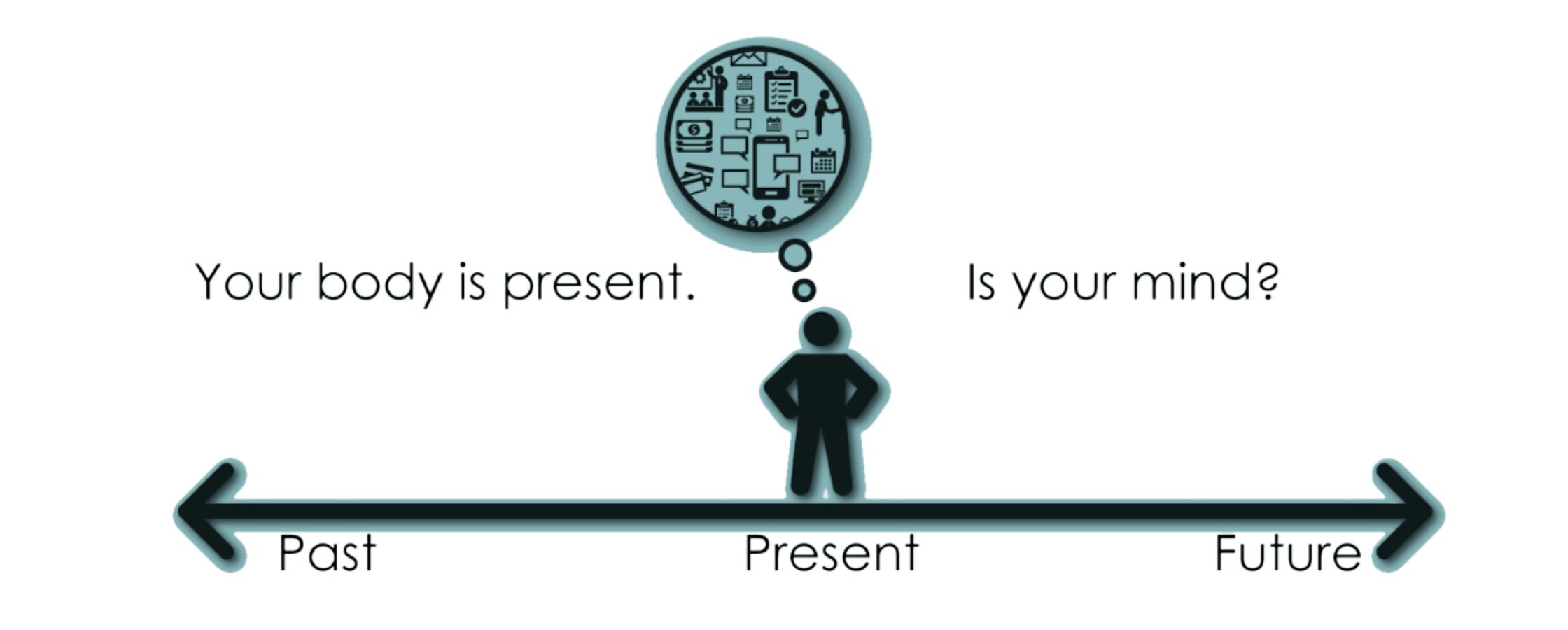
Mindfulness (in Action) Builds Resilient Employees
If you’re like most people, your mind is wandering approximately 50% of the time.
For example:
Have you ever been sitting in a meeting, but your thoughts were focused on that difficult conversation you knew you had to have with a colleague tomorrow, wondering if you’d have the time you need to put those finishing touches on that project before the deadline, worrying about your kids’ latest report card, or simply thinking about what you’ll have for lunch?
Maybe you’ve found yourself thinking about a conversation or disagreement you had with someone earlier that day, the dishes you forgot to put away the night before, or the mistake you made last week.
Your physical body may be present in the meeting, but your mind is in the future or in the past.
Every one of us have experienced this. And it creates a problem in the workplace.
It can also create a problem for our mental health and overall well-being.
Mindful vs. Mindless
In any moment, we are either in a mindful or mindless state. We are either in the zone and paying attention (mindful), or caught up in thoughts that keep us from the here and now (mindless).
When we are mindless, we behave automatically and can get caught up thinking about the past or the future. This can often lead to mistakes. It can feel like we are going through the same day over and over again. It can create disengagement and additional stress or anxiety, especially if our mind is swept up in thoughts of worry, anger or self-doubt.
Building Self Awareness to Stay Mindful
We may find ourselves in a mindless state thinking about simple tasks we need to do, such as what we’re going to make for dinner or remembering that we need to book an appointment for an oil change.
In other cases, we’re swept up in thoughts of stress, anxiety, worry, fear, anger and self-doubt - particularly when we’re met with challenging situations such as a mistake you made on a project, changes to management or workflows, a conversation or conflict with a colleague, or even spilling coffee on your pants before an important meeting.
When people are met with challenges - big or small - an untrained mind will start thinking about all the ways this has gone or could go wrong, and what this challenge might mean to your personal situation. It’s common for people to ruminate on these thoughts for hours, days, weeks, months or even years. When a person ruminates on these thoughts, stress builds in the body.
When a person is stressed, their nervous system is activated which impacts the executive functions of the brain and they are less able to focus on overcoming the obstacle and completing the task at hand. This can lead to decreased productivity and mistakes. People may begin to feel stuck, overwhelmed, angry, frustrated or even defeated.
Mindfulness teaches us how to flex our mental muscles of attention, self regulation and patience. This helps us become less stressed, more focused and able to perform at our best whether we are working on a project, or talking with colleagues or clients.
What is Mindfulness?
For many, the word mindfulness conjures images of long sessions of guided meditation in a candle-lit room.
We like to understand mindfulness as seeing clearly in order to respond effectively. Mindfulness is the basic human capacity to stay focused in the present moment on all that is arising, without judging what is happening and without letting the mind take you away from the present moment. We all have the capacity to be mindful. It just takes the right guidance and a little practice.
So, although long periods of meditation is a great mindfulness exercise for becoming more mindful, most of us don’t have the time (or desire) to actually partake in long periods of meditation. And asking your employees to do that might significantly disrupt the workday. That’s why at MindWell, we teach mindfulness-in-action. This proprietary method allows your employees to practice mindfulness anywhere, anytime, particularly during other tasks, so they can learn to stay in a mindful state much faster, and can regulate stress effectively during any challenging situation.
What is Mindfulness-in-Action?
Many mental health and well-being apps and programs rely on long, guided meditations and practices to create change. When people learn to rely on guided practices and meditation to ease their mind, it can be difficult for them to apply the tools they’re meant to be learning in real-life situations.
If someone is in a meeting that’s particularly stressful, or they’re in the midst of a challenging conversation, it’s simply not practical to pause, put on their headphones and listen to a guided meditation or practice. That’s why MindWell teaches Take 5, an active coping tool designed to be simple, easy to remember and most importantly, effective.
As we know, the mind can get very busy. In order to feel confident that we’re making the right decisions and acting effectively in response to each project, situation or challenge we are met with, it’s important to have tools and strategies at our fingertips to reign in that busy mind. When we operate from a mindful state, our focus is increased allowing us to feel confident in our actions and eliminate feelings of regret later on, had we acted instead from a mindless state.
MindWell’s core training can be done in just 5-10 minutes per day, and teaches your employees easy-to-use tools for any situation, including the 5 simple steps to Take 5.
Employees will learn how to integrate this practice into any moment of any day. It’s simple, effective and can be done without anybody even knowing they’re doing it - so when that meeting or conversation gets tough, they can practice Take 5 in the moment to decrease stress and bring more calm and clarity into the situation.
Mindfulness in Action Builds a Resilient Workforce
When your employees have the tools they need to decrease stress in any situation, they can handle and adapt to challenging situations more quickly and easily (resilience) and the workplace becomes a happier, healthier place. Employees become more engaged and are better able to focus on and complete their work.
Want to learn more about how mindfulness-in-action can benefit your organization? Speak with a MindWell representative today.






